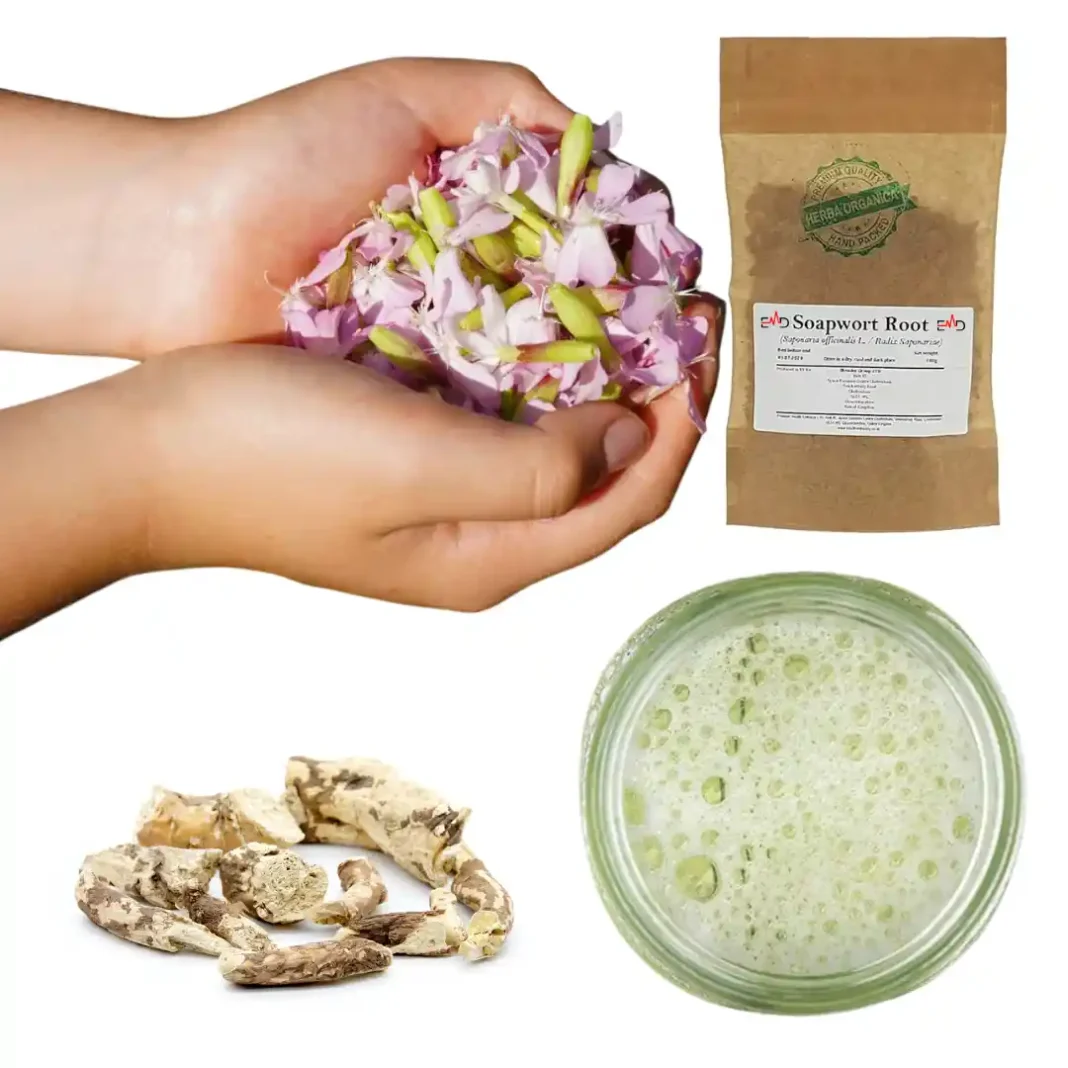Exercise Daily – Soapwort, scientifically known as Saponaria officinalis, is a versatile herb with remarkable cleaning properties. For centuries, it has been used to create a soap-like cleaning action that is both eco-friendly and gentle on the skin. If you want to add soapwort to your natural cleaning routine with Soapwort Recipes in 2024, you’re in for a treat. Soapwort contains natural saponins, which make it easy to brew homemade cleansers, shampoos, and mild detergents. Whether you’re using fresh leaves, dried stems, or the whole plant, soapwort can offer a mild cleanser perfect for everyday use, and it’s easy to grow near ponds or compost areas, making it an ideal addition to any eco-conscious home.
Athletes benefit immensely from physical activity, both in terms of physical and mental health. Regular exercise helps improve cardiovascular health, strengthen muscles, and enhance endurance, making athletes more resilient to physical challenges. These physical benefits also extend to better coordination, flexibility, and agility, which are crucial for excelling in sports. Additionally, athletes often enjoy a healthier body composition with lower body fat and a stronger immune system, reducing the risk of diseases.
What is Soapwort?
Soapwort, also known as Bouncing Bet, is a hardy perennial herb. Its natural saponin content creates a soap-like lather when mixed with water, making it a fantastic alternative to chemical-laden soaps. Originating in Europe and Asia, soapwort has been used throughout history for personal care, laundry, and even textile cleaning. Unlike commercial cleaning products, soapwort is gentle on the skin and environmentally friendly. Plus, it’s non-toxic and biodegradable!
One of the best ways to incorporate soapwort into your home is by making soap or creating a tea for a conditioning rinse. Simply add soapwort to water, shake it well, and enjoy the suds that form naturally. Whether you’re dealing with problem hair or looking to freshen old fabrics, soapwort soap offers a squeaky clean result without the need for harsh chemicals.
Why Use Soapwort for Cleaning?
If you’re conscious about the chemicals in your cleaning products, soapwort is the perfect solution. This herb cleans effectively without stripping away natural oils, making it great for personal and household care. Here’s why soapwort should be part of your green cleaning routine:
- Gentle on Skin: Ideal for people with sensitive skin or allergies.
- Eco-Friendly: No harmful chemicals or pollutants.
- Versatile: Can be used for hair, skin, laundry, and household cleaning.
- Biodegradable: Safe for the environment, making it a sustainable choice.
Beyond physical advantages, athletes experience significant mental health benefits. Exercise is known to release endorphins, which act as natural mood boosters, helping to alleviate stress, anxiety, and depression. It also sharpens cognitive functions, such as concentration, decision-making, and memory. Athletes, particularly those engaged in team sports, also benefit from improved social interactions, learning teamwork, discipline, and time management skills, which contribute to personal growth and success on and off the field.
How to Harvest and Prepare Soapwort
Before we jump into the recipes, it’s essential to know how to harvest and prepare soapwort. The entire plant-roots, stems, and leaves contain saponins, though the roots hold the highest concentration. Here’s how to prepare it for your green cleaning needs:
- Harvesting: Pick soapwort when it’s in bloom for maximum saponin content. You can also use the roots after the plant has died back in the fall.
- Drying: Hang the stems upside down in a cool, dark place to dry. Once dry, store the herb in an airtight container for future use.
- Preparation: For most recipes, you must boil soapwort in water to extract the saponins.
Now that you know how to prepare soapwort, let’s explore some creative ways to use it!

1. Soapwort Shampoo Recipe
One of the most popular uses of soapwort is as a natural shampoo. It cleanses hair effectively without the harshness of commercial shampoos. This recipe is gentle on the scalp and perfect for people with sensitive skin.
Herbalists have long recommended using this plant for its cleansing power, especially since it is gentle enough to use on sensitive skin or near fish ponds without harming aquatic life. If you’ve ever tried using soapnuts or vinegar rinse, you’ll be excited to try this gentle, Western herb that’s both sustainable and powerful.
Ingredients:
- 4 tablespoons of dried soapwort root (or 1 cup fresh)
- 1 liter of distilled water
- Essential oils (optional)
Directions:
- Boil the soapwort root in distilled water for 20 minutes.
- Let the mixture cool, then strain.
- Add a few drops of essential oils like lavender or rosemary for fragrance.
- Store in a bottle and shake before each use.
This soapwort shampoo leaves your hair clean and shiny without stripping away natural oils. It’s great for all hair types and helps with dandruff and itchy scalp.
Benefits of Soapwort Shampoo
- Natural Cleanser: Gently removes dirt without the need for chemicals.
- Scalp-Friendly: Helps maintain moisture balance in your scalp.
- No Harsh Chemicals: Say goodbye to synthetic ingredients!
2. Soapwort Liquid Soap for Hands and Body
Creating a liquid soap with soapwort is easy and perfect for daily use. It’s a gentle, non-toxic alternative to commercial hand soaps that often contain drying agents and synthetic fragrances.
Ingredients:
- 3 tablespoons dried soapwort
- 1 liter of water
- Essential oils for scent (optional)
Directions:
- Boil the dried soapwort in water for 10–15 minutes.
- Strain and pour into a soap dispenser.
- Add a few drops of essential oils for a pleasant scent.
Why This Recipe is Perfect for Daily Use:
- Mild on Skin: Great for frequent handwashing.
- Eco-Friendly: Biodegradable, so it doesn’t harm the environment.
- Customizable: Add your favorite essential oils for fragrance.
3. Soapwort Laundry Detergent
Soapwort’s natural saponins make it an excellent alternative to traditional laundry detergents. It’s gentle on fabrics but tough on stains, making it an effective natural cleaner.
Ingredients:
- 1 cup dried soapwort
- 1 gallon of water
Directions:
- Boil soapwort in water for 20 minutes.
- Strain and allow it to cool.
- Use about 1 cup of this liquid per load of laundry.
Soapwort detergent is biodegradable and free from synthetic chemicals, making it safe for the environment and your skin. Add a bit of baking soda or vinegar to the mix for extra stain-fighting power.
4. Soapwort Dish Soap
Soapwort is mild enough for dishwashing, making it a great eco-friendly alternative to commercial dish soap.
Ingredients:
- 2 tablespoons dried soapwort
- 1 liter of water
Directions:
- Boil soapwort in water for 15 minutes.
- Strain and let it cool.
- Use the liquid to wash dishes. It cuts through grease while being gentle on your hands.
You’ll love how this soap cleans your dishes without any chemical residue.

5. Soapwort Face Wash for Acne-Prone Skin
Soapwort’s mild cleansing properties make it an excellent face wash, especially for acne or sensitive skin.
Ingredients:
- 2 tablespoons dried soapwort
- 500 ml water
- A few drops of tea tree or lavender essential oil
Directions:
- Boil the soapwort in water for 10 minutes.
- Strain and let it cool.
- Add essential oils for extra acne-fighting properties.
- Use this face wash morning and night for clear, soft skin.
Why Soapwort is Great for Skin:
- Gentle on Acne: Doesn’t strip the skin of its natural oils.
- Non-Toxic: No harsh chemicals that can irritate sensitive skin.
- Soothing: Ideal for soothing inflamed or irritated skin.
6. All-Purpose Cleaner with Soapwort
Soapwort can be combined with vinegar to create a powerful, eco-friendly all-purpose cleaner.
Ingredients:
- 3 tablespoons dried soapwort
- 1 liter water
- ½ cup vinegar
Directions:
- Boil soapwort in water for 15 minutes.
- Strain and add vinegar to the cooled liquid.
- Pour into a spray bottle and use for cleaning surfaces like countertops and sinks.
Benefits:
- Effective on Grime: Cuts through dirt and grease.
- Non-toxic: Safe to use around children and pets.
- Cost-Effective: A simple and affordable cleaning solution.
7. Herbal Soapwort Hair Infusion
Boost your soapwort shampoo with the power of herbs. This infusion not only cleanses but also adds shine and nourishment to your hair.
Ingredients:
- 2 tablespoons dried soapwort
- 1 tablespoon rosemary or peppermint leaves
- 1 liter of water
Directions:
- Boil soapwort and herbs in water for 20 minutes.
- Strain and let cool.
- Use it as a rinse or as a base for your shampoo.
Herbs like rosemary stimulate hair growth, while peppermint soothes the scalp.
8. Soapwort Pet Shampoo
Soapwort is a natural, safe option for bathing your pets. It gently removes dirt and oils from their fur without the use of harsh chemicals.
Ingredients:
- 1 cup dried soapwort
- 1 liter water
Directions:
- Boil soapwort in water for 20 minutes.
- Strain and let cool.
- Use it to wash your pet’s fur, avoiding the eyes and ears.
Soapwort helps to repel fleas and leaves your pet’s coat shiny and soft.
9. Soapwort Body Wash with Essential Oils
Elevate your shower routine with a luxurious soapwort body wash infused with essential oils.
Ingredients:
- 3 tablespoons dried soapwort
- 1 liter of water
- Essential oils (like eucalyptus or lavender)
Directions:
- Boil the soapwort in water for 10 minutes.
- Strain and add your favorite essential oils.
- Store in a bottle and use it as a gentle body wash.
This soap is perfect for people with sensitive skin and refreshes you.

10. Growing Soapwort at Home
Interested in growing soapwort? It’s surprisingly easy and adds a lovely touch to any garden. Here’s how to get started:
Planting Instructions:
- Choose a sunny spot in your garden.
- Plant soapwort seeds or cuttings in well-drained soil.
- Water occasionally, and watch your soapwort thrive!
Once it’s established, you’ll have a year-round supply of this versatile herb for all your green cleaning needs.
1. Red Soapwort Tincture, Organic Red Soapwort Extract
Red Soapwort Tincture is a high-quality, organic herbal extract derived from the Saponaria officinalis plant. Known for its gentle yet effective cleansing and soothing properties, Soapwort has been used for centuries in traditional medicine to promote skin health and wellness.
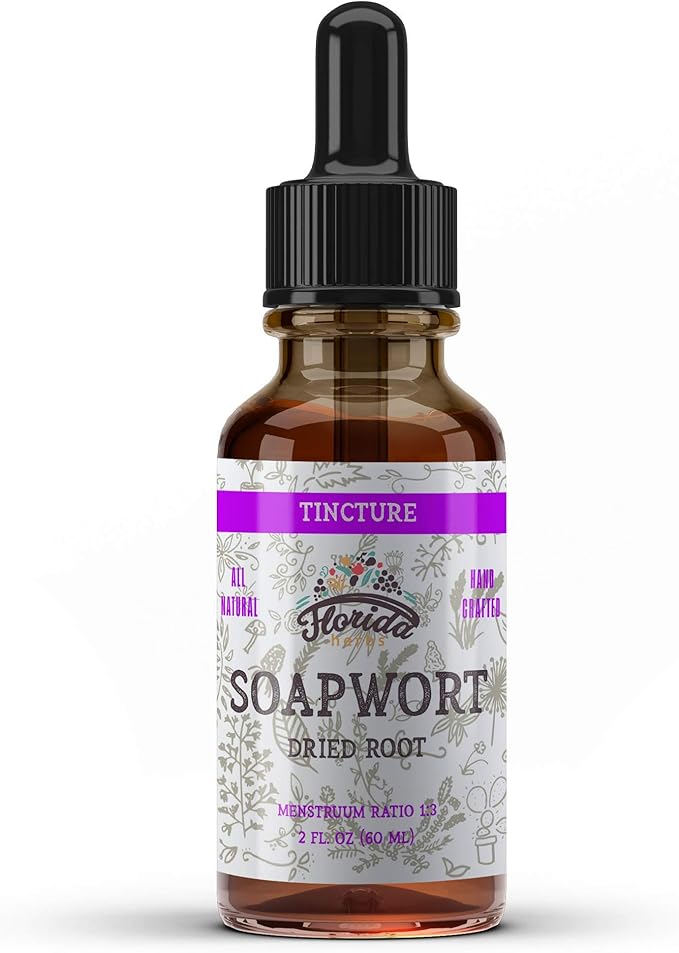
Features:
- Organic Red Soapwort extract
- Cold-pressed for potency
- Supports skin and digestive health
- Easy-to-use tincture form
- Made with non-GMO ingredients
Pros and Cons:
Pros:
- Organic and free from synthetic additives
- Convenient dropper bottle for precise dosage
- Versatile usage for skin and health benefits
Cons:
- May not be suitable for individuals with allergies to soapwort
- Requires consistent use for noticeable results
2. Soapwort B60 Alcohol-Free Herbal Extract Tincture
Soapwort B60 Alcohol-Free Herbal Extract is a concentrated tincture of Saponaria officinalis. It is designed for individuals seeking a gentle, alcohol-free herbal solution. Soapwort has been traditionally valued for its natural cleansing and purifying properties.
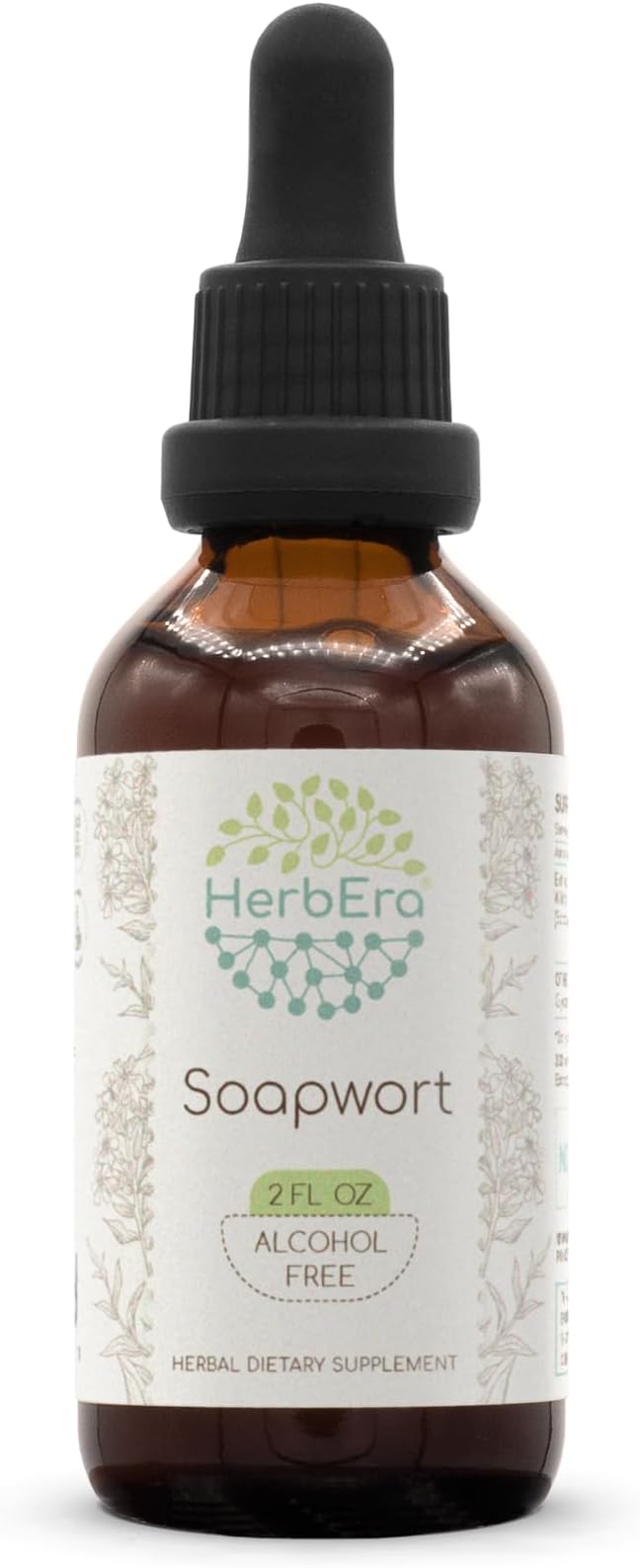
Features:
- Alcohol-free formula
- High concentration of Soapwort extract
- Non-GMO and gluten-free
- Easy absorption liquid format
- Supports skin health and digestion
Pros and Cons:
Pros:
- Alcohol-free, ideal for sensitive users
- High-potency formula
- Versatile usage for internal and external benefits
Cons:
- May require long-term use for full benefits
- Taste may not be appealing to everyone
3. Soapwort (Saponaria officinalis) Liquid Extract 4 fl.oz
The Soapwort Liquid Extract offers a natural, liquid form of Saponaria officinalis, also known as Soapwort. Known for its cleansing qualities, this extract supports both internal and external health, promoting skin vitality and digestive wellness.
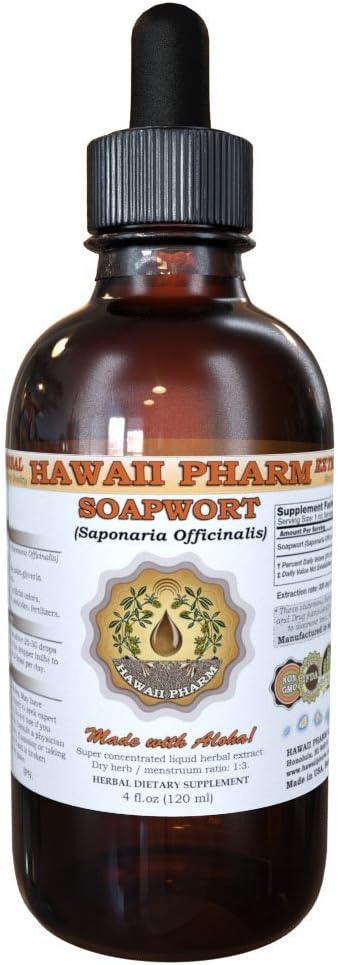
Features:
- Contains pure Soapwort extract
- Comes in a convenient liquid format
- Promotes skin clarity and digestive comfort
- All-natural ingredients
- 4 fl.oz bottle for extended use
Pros and Cons:
Pros:
- Highly concentrated formula
- Convenient liquid form for easy consumption
- Versatile usage for skin and health
Cons:
- May not be suitable for all skin types
- Results may vary based on individual health conditions
4. Soapwort Root-Stock (Saponaria officinalis – rhizoma)
Soapwort Root-Stock (rhizoma) is derived from the root of the Saponaria officinalis plant. This powerful herbal remedy has been utilized for centuries for its cleansing, anti-inflammatory, and detoxifying properties, making it a versatile ingredient for both skincare and health.
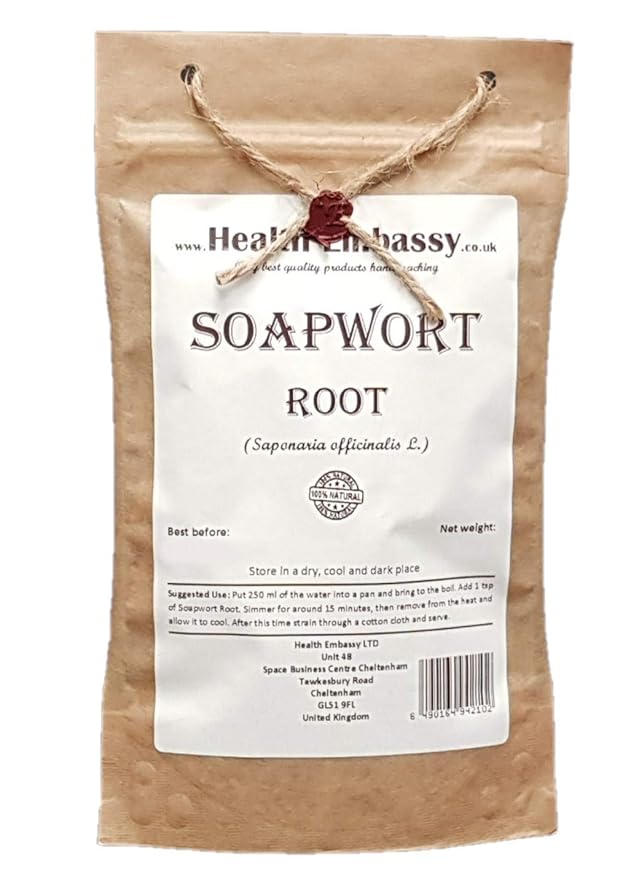
Features:
- Raw Soapwort root stock for natural remedies
- Saponin-rich content for cleansing and purifying effects
- 100% natural and chemical-free
- Traditionally used in herbal medicine
Pros and Cons:
Pros:
- Highly effective for skin cleansing
- Can be used in a variety of DIY preparations
- No artificial additives or chemicals
Cons:
- Requires preparation before use
- Limited shelf life compared to processed extracts
5. Health Embassy Soapwort Root | Saponaria Officinalis L | 100% Natural
Health Embassy Soapwort Root is a 100% natural herbal product sourced from the Saponaria officinalis plant. Known for its high saponin content, Soapwort Root is ideal for natural skincare formulations and internal cleansing solutions.
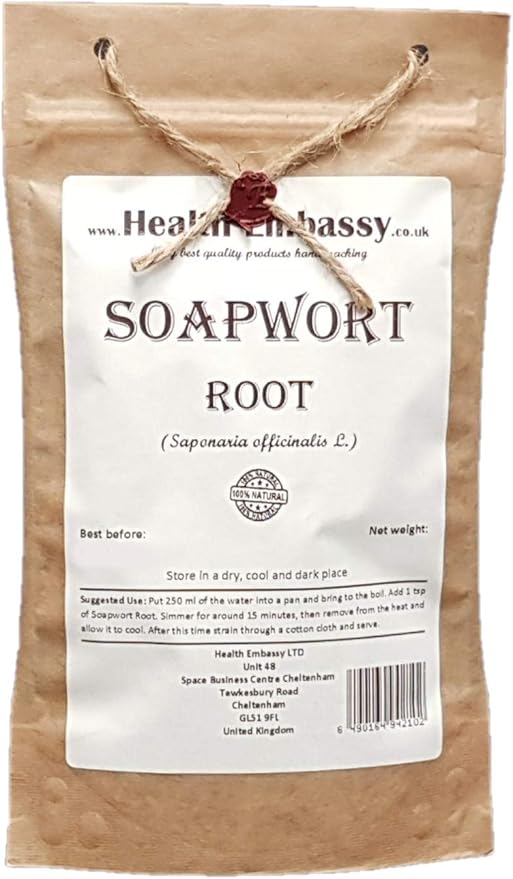
Features:
- 100% natural Soapwort root
- Rich in saponins for gentle cleansing
- Suitable for making teas, extracts, or skin cleansers
- Sustainably sourced and chemical-free
Pros and Cons:
Pros:
- Versatile product for both skincare and health
- Pure, natural ingredients with no additives
- Ideal for homemade herbal remedies
Cons:
- Requires preparation for use
- May not be convenient for on-the-go applications
6. Soapwort Root Powder (4 oz, ZIN: 512401)
Soapwort Root Powder is a finely ground version of the Saponaria officinalis plant’s root, known for its rich saponin content. This powder is a versatile, all-natural ingredient perfect for DIY beauty recipes and traditional herbal health applications.
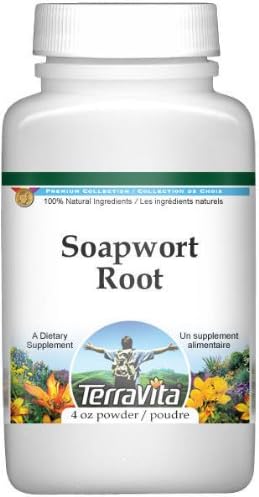
Features:
- Finely ground Soapwort root powder
- Rich in cleansing saponins
- Ideal for creating soaps, shampoos, and skin cleansers
- All-natural and chemical-free
Pros and Cons:
Pros:
- Versatile and easy to incorporate into DIY skincare
- Powder form allows for precise usage
- Naturally derived with no added chemicals
Cons:
- Requires mixing and preparation
- May not suit all skin types
7. Semen VACCARIAE (Cow Soapwort) 16 OZ
Semen VACCARIAE, or Cow Soapwort, is a traditional Chinese herb known for its blood circulation and skin health benefits. This 16 oz package offers a high-quality, natural remedy used for centuries in Eastern medicine.
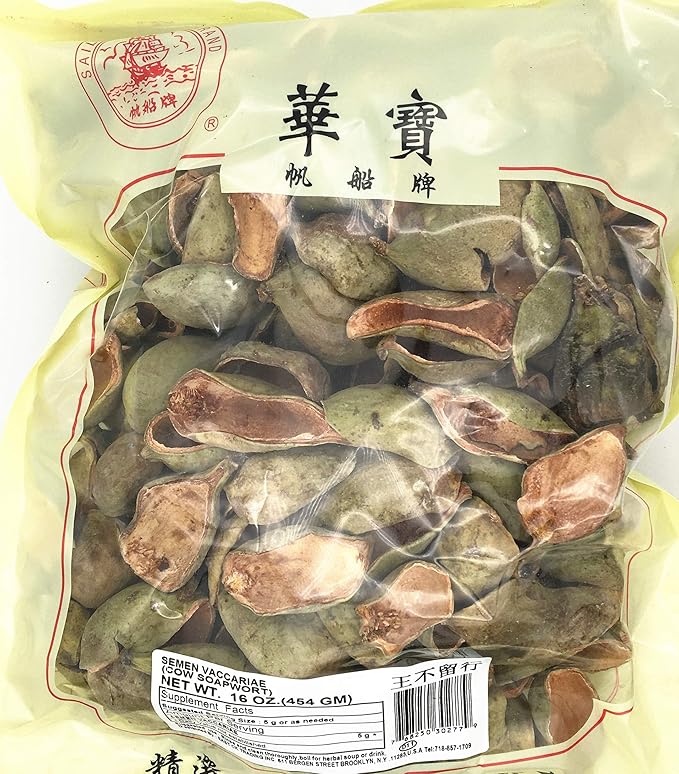
Features:
- Contains Semen VACCARIAE (Cow Soapwort)
- 16 oz of dried herb
- Supports blood circulation and skin health
- Traditionally used in Eastern medicine
Pros and Cons:
Pros:
- Large package for extended use
- Traditional remedy with a proven history
- Natural and chemical-free
Cons:
- May require preparation before use
- Not widely known in Western herbal medicine
The Benefits of Soapwort and How to Use It
1. Natural and Non-Toxic Cleaning Agent:
Soapwort is a powerful yet gentle cleanser that is safe for the environment. Its natural saponins; organic compounds that create a soapy lather—make it an excellent alternative to chemical soaps and detergents. Unlike conventional cleaners that contain harsh chemicals, soapwort is biodegradable and toxins-free, making it perfect for those who want to reduce their environmental footprint and keep their homes free from synthetic substances.
This gentle nature makes soapwort especially beneficial for those with sensitive skin or allergies to conventional soaps. It doesn’t strip the skin of its natural oils, leaving it soft and smooth after use.
2. Eco-Friendly Laundry Detergent:
One of the most fascinating uses of soapwort is as a natural laundry detergent. Before the mass production of modern detergents, soapwort was often used to wash delicate fabrics like wool, lace, and silk. Its gentle cleansing properties ensure that your clothes are cleaned without causing wear and tear or fading.
Using soapwort in your laundry also has the added benefit of reducing the need for chemical-based detergents, which often leave residues that are harmful to the skin and environment.
3. Gentle Skin Cleanser:
Soapwort is ideal for skin care, particularly for those prone to irritation or sensitive skin. Its gentle nature means it can cleanse the skin without causing dryness or irritation, making it a popular ingredient in natural face washes and body cleansers. People with skin conditions such as eczema or psoriasis may find soapwort a soothing alternative to commercial skincare products that can aggravate their symptoms.
The natural saponins in soapwort work to lift dirt and oils from the skin without disrupting the skin’s natural balance, making it a great option for maintaining healthy, glowing skin.
4. Anti-Inflammatory and Antimicrobial Properties:
Soapwort is not only a cleanser but also has medicinal benefits. It contains natural anti-inflammatory properties that can soothe irritated skin. This makes it a good option for treating skin conditions like acne, rashes, and insect bites. Its antimicrobial qualities also help keep the skin clean and free from bacteria.
These healing properties can extend to more than just skincare. Soapwort infusions have traditionally been used in herbal medicine to treat respiratory conditions such as coughs, bronchitis, and sore throats, as they help to reduce inflammation and clear mucus.
5. A Natural Shampoo:
If you’re looking for a chemical-free hair care solution, soapwort might be the answer. Its saponin content acts as a natural shampoo, cleansing the scalp and hair without stripping it of essential oils. Regular use of soapwort as a shampoo can result in softer, shinier hair that is free from the buildup caused by synthetic products.
Soapwort can provide a soothing cleanse without aggravating conditions like dandruff or scalp dryness for people with scalp sensitivities.
6. Fabric and Art Restoration:
Soapwort has also been used for centuries to clean delicate and historic textiles, as its mild detergent properties don’t harm fabrics. In museums, it’s used to restore ancient tapestries and delicate garments, preserving their integrity while removing grime and dirt. Its gentle yet effective cleaning action makes it a perfect choice for anyone looking to safely clean valuable or fragile textiles at home.
7. DIY Beauty Products:
Soapwort can be used to create a variety of homemade beauty products. From face cleansers to toners and body wash to shampoos, the versatility of this plant allows for a myriad of personal care recipes. For those who enjoy DIY skincare, soapwort provides an affordable and natural option for creating your own products at home.
FAQs – 10 Must-Try Soapwort Recipes for a Greener Home in 2024
Q: Can I use soapwort for laundry?
A: Yes! Soapwort is a natural, gentle laundry detergent alternative.
Q: Is soapwort safe for sensitive skin?
A: Absolutely. It’s perfect for people with skin conditions like eczema or psoriasis.
Q: Where can I find soapwort?
A: You can grow it at home or purchase dried soapwort from herbal stores or online retailers specializing in natural products.
Q: How long does homemade soapwort shampoo last?
A: Soapwort shampoo typically lasts about a week when stored in the refrigerator. For longer storage, you can freeze it in small batches.
Q: Does soapwort lather like commercial soaps?
A: Soapwort produces a mild lather, not as bubbly as commercial soaps but still effective for cleaning. The saponins create a gentle, soap-like foam that works wonders for personal care and household cleaning.
Conclusion
Soapwort is a hidden gem in the world of natural, plant-based cleaning solutions. Whether you’re looking to detoxify your home from chemical cleaners or seeking gentler alternatives for your personal care routine, these 10 must-try soapwort recipes are a fantastic start. From shampoo to laundry detergent, soapwort offers endless possibilities for a greener, cleaner home in 2024. Plus, its biodegradable nature makes it a win for both your health and the environment. So why not try soapwort and see how it can revolutionize your home cleaning routine?

